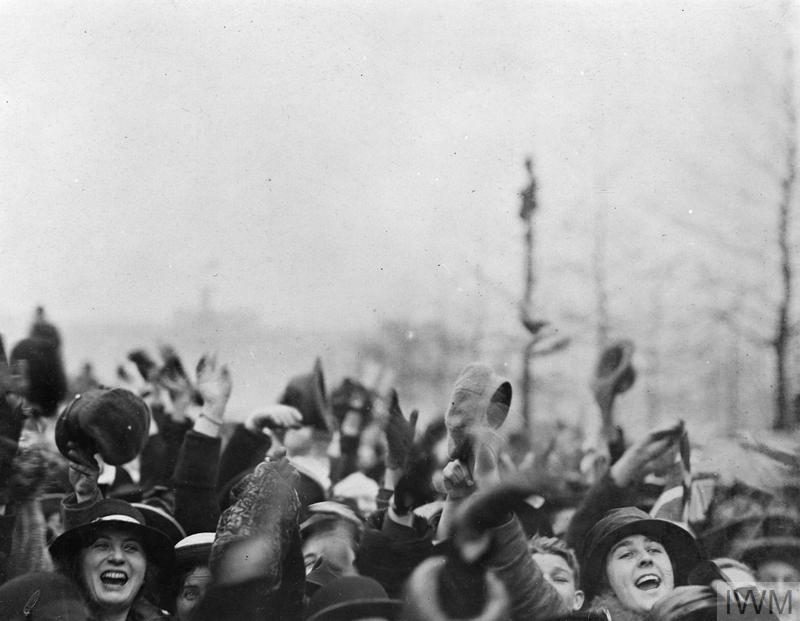
THE ARMISTICE DAY, NOVEMBER 1918 (Q 80135) Crowd cheering outside Buckingham Palace during the Armistice Day, 11 November 1918. Copyright: © IWM. Original Source: http://www.iwm.org.uk/collections/item/object/205324739
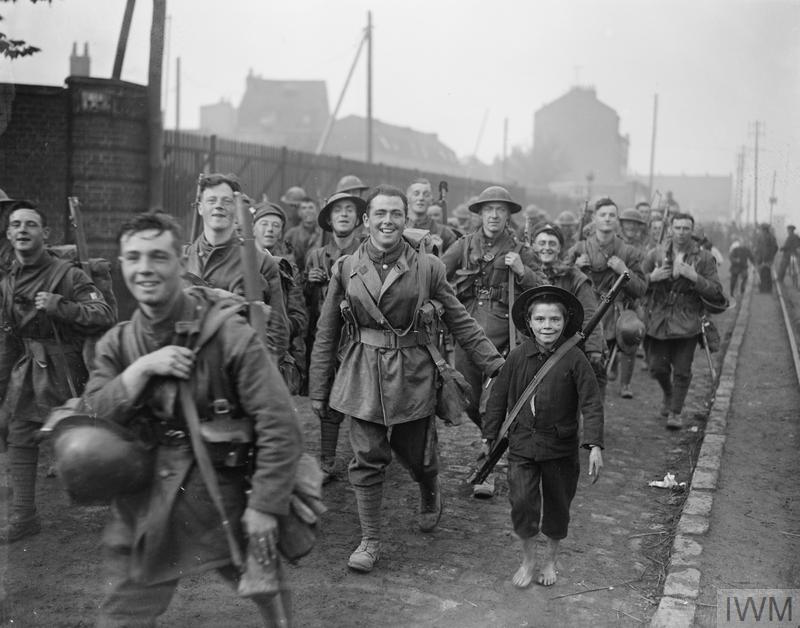
THE HUNDRED DAYS OFFENSIVE, AUGUST-NOVEMBER 1918 (Q 9574) Troops of the 8th Battalion, the King’s (Liverpool Regiment, Liverpool Irish, 57th Division) entering Lille, 18 October 1918. Note a barefooted French boy with a rifle, clearly given to him by a smiling soldier on his right. Copyright: © IWM. Original Source: http://www.iwm.org.uk/collections/item/object/205245319
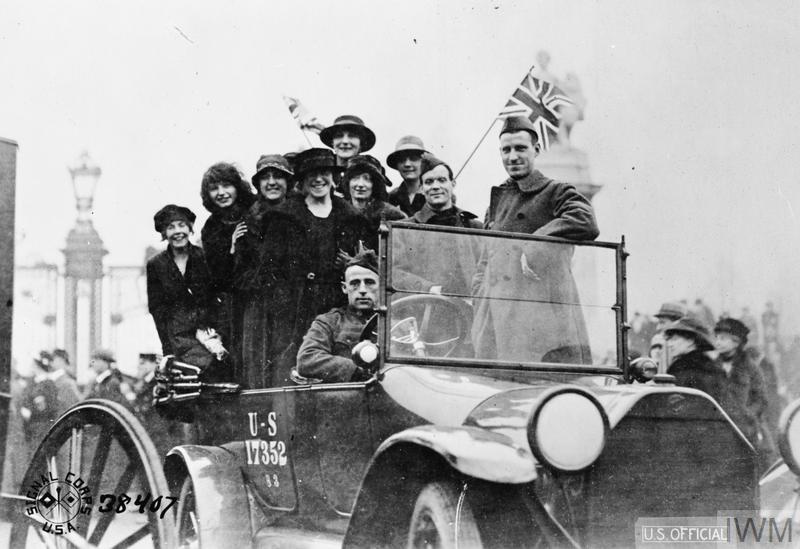
THE ARMISTICE DAY, NOVEMBER 1918 (Q 65858) A group of happy girls in an American automobile in London on the day the Armistice was signed, 11 November 1918. Copyright: © IWM. Original Source: http://www.iwm.org.uk/collections/item/object/205086034
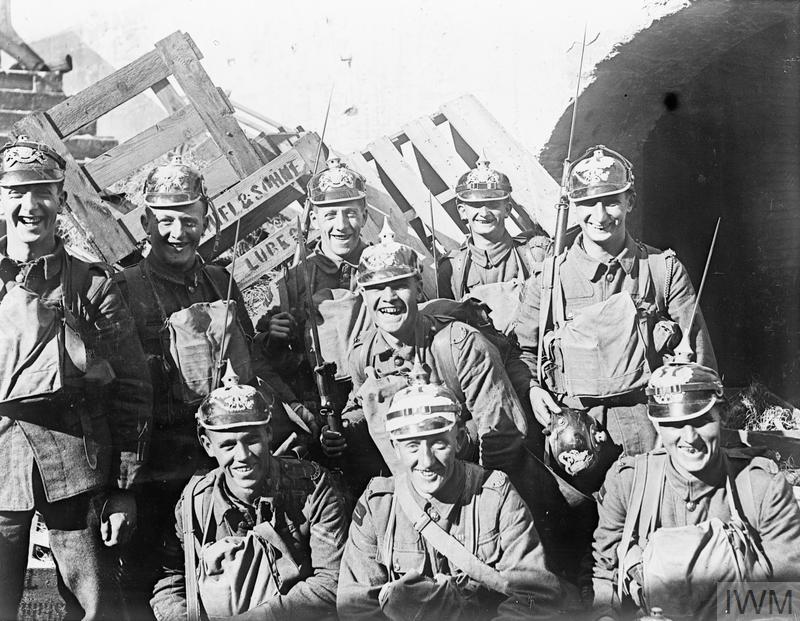
THE HUNDRED DAYS OFFENSIVE, AUGUST-NOVEMBER 1918 (Q 11367) Capture of Cambrai by the British 57th Division. Soldiers of the Loyal North Lancashire Regiment wearing pickelhaubes which they found whilst on patrol in Cambrai, 9 October 1918. Copyright: © IWM. Original Source: http://www.iwm.org.uk/collections/item/object/205216088
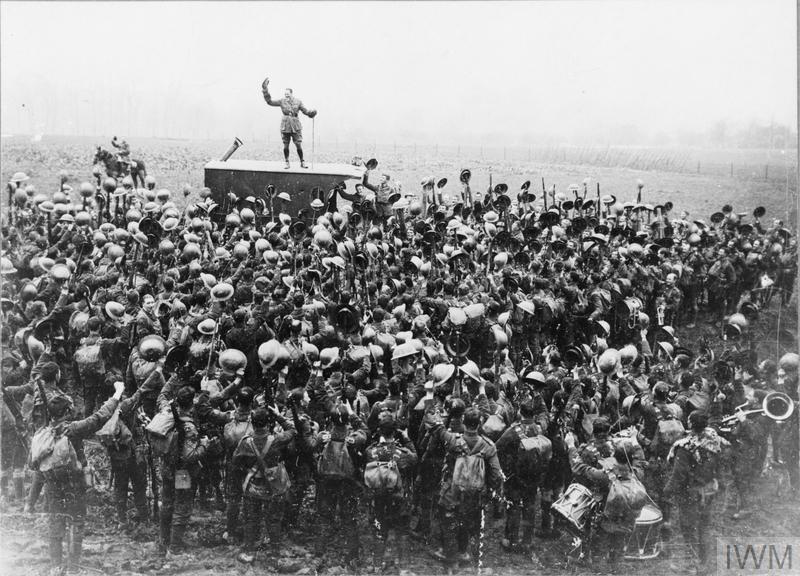
THE BRITISH ARMY ON THE WESTERN FRONT, 1914-1918 (Q 3362) The Commanding Officer of the 9th Battalion, East Surrey Regiment stands on a lorry surrounded by his men and leads a cheer to the King, St Waast, near Bavai, 12 November 1918. Copyright: © IWM. Original Source: http://www.iwm.org.uk/collections/item/object/205235905
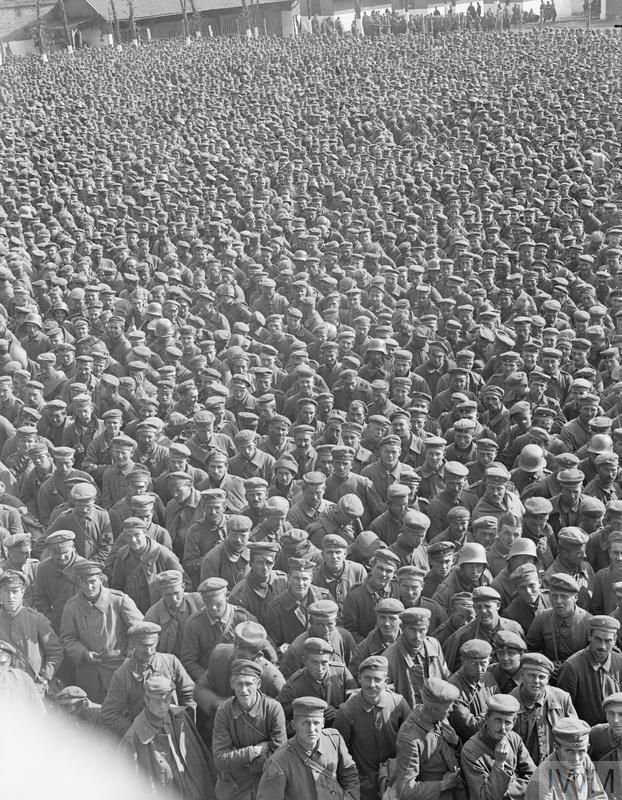
THE HUNDRED DAYS OFFENSIVE, AUGUST-NOVEMBER 1918 (Q 9358) Battle of St Quentin Canal (Saint-Quentin). Prisoners in a clearing depot at Abbeville, 2nd October 1918. Copyright: © IWM. Original Source: http://www.iwm.org.uk/collections/item/object/205245117
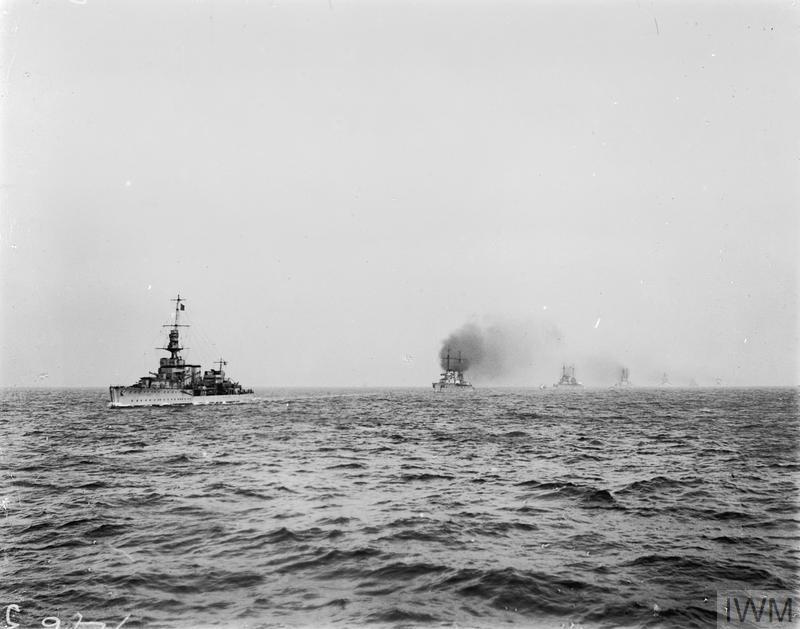
THE SURRENDER OF THE GERMAN HIGH SEAS FLEET, NOVEMBER 1918 (Q 19288) Royal Navy light cruiser HMS Cardiff leading the German battle cruisers into the Firth of Forth. Copyright: © IWM. Original Source: http://www.iwm.org.uk/collections/item/object/205193781
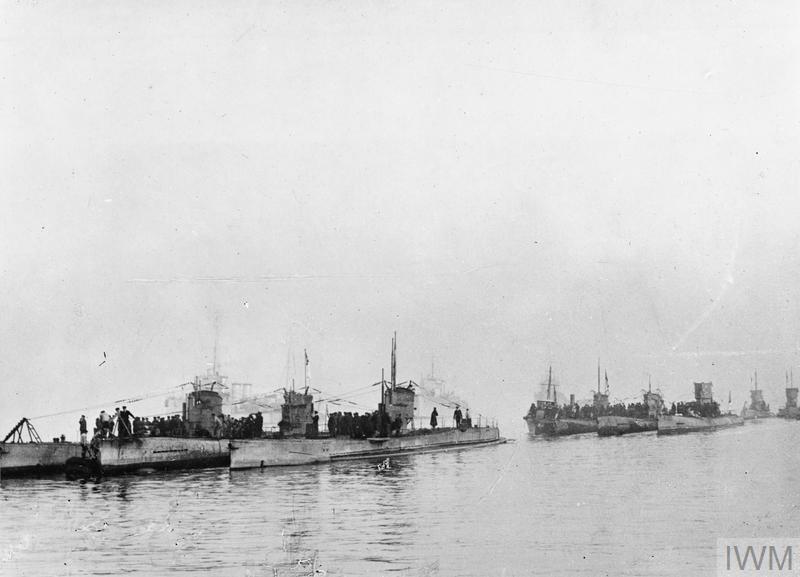
THE SURRENDER OF THE GERMAN HIGH SEAS FLEET, NOVEMBER 1918 (Q 20157) German submarines at their moorings at Parkestone Quay, Harwich, November 1918. Copyright: © IWM. Original Source: http://www.iwm.org.uk/collections/item/object/205260942
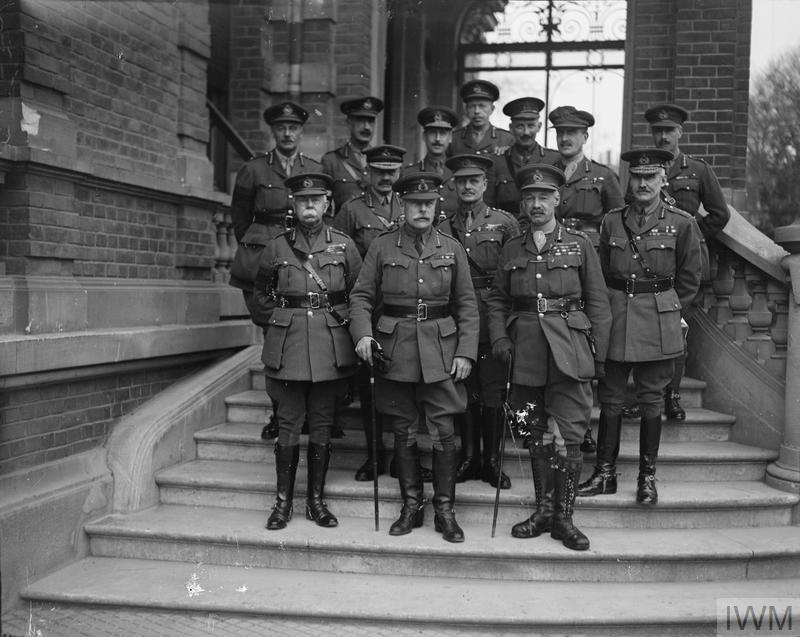
THE BRITISH ARMY ON THE WESTERN FRONT, 1914-1918 (Q 9689) Field Marshal Douglas Haig (centre front) with his Army Commanders at Cambrai, 11 November 1918. Left to right behind him are: General Herbert Plumer (Second Army), General Julian Byng (Third Army), General William Birdwood (Fifth Army), General Henry Rawlinson (Fourth Army), and General Henry Horne (First Army). Behind them are Lieutenant Generals John Davidson, Montgomery, Louis Vaughan and othe… Copyright: © IWM. Original Source: http://www.iwm.org.uk/collections/item/object/205125186
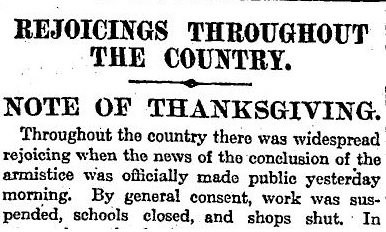
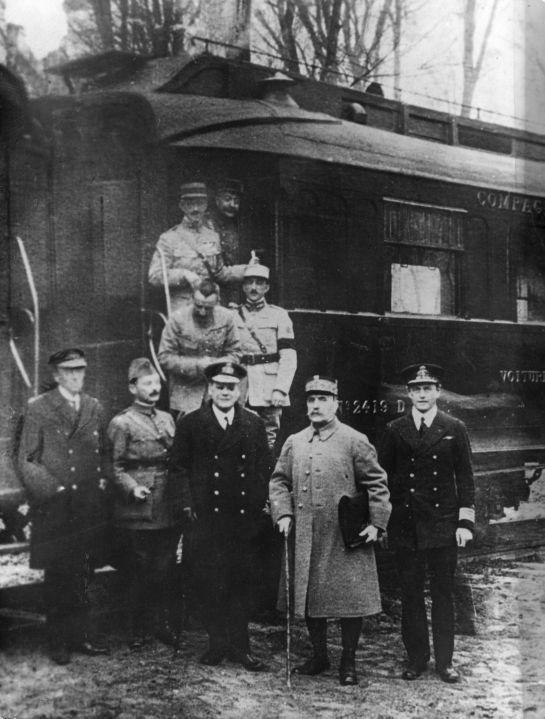

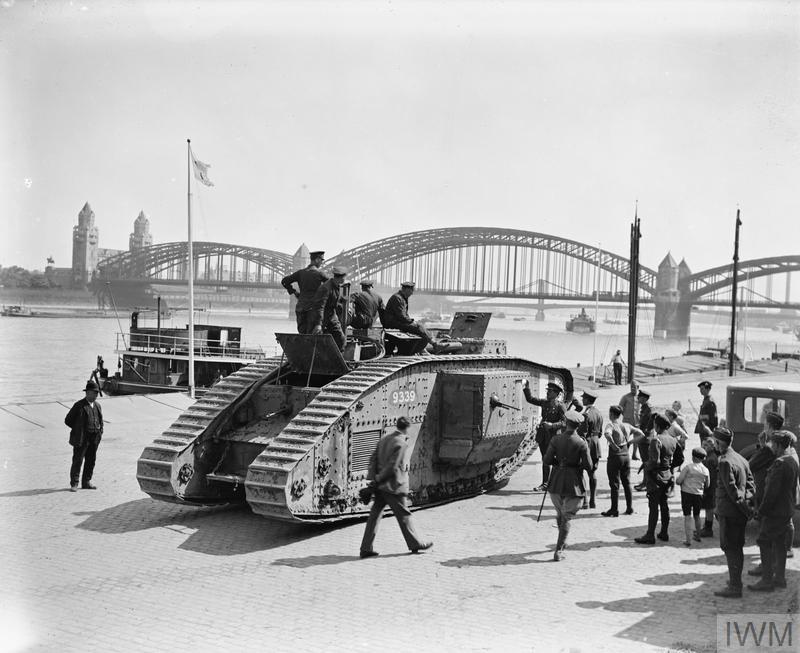




Except that it wasn’t ‘Victory’ but an Armistice, the prelude to a Peace Treaty. Thankfully, the fighting stopped albeit many battles carried on and conflagrations arose from Siberia to Greece and Poland.
Victory would have been the Allied bands marching down Unter den Linden with the Kaiser’s head on a spike, Bavaria being hived off as a distinct Kingdom and all those who directed the many crimes of the German Army (such as the Rape of Louvain) getting the justice they deserved.
But in the belly of the tamed and cornered Socialist beast, thoughts of revenge grew, putrid ideologies festered and bred, like late 20th Century bacteria exchanging plasmids for antibiotic resistance in a sickly patient when amputation of the infected limb is ruled out, until bursting forth with renewed vigour, determination and hatred 20 years on as a plague on the world.
Mr Ed, what is your opinion of the Versailles Treaty? The bien-pensant everywhere deplore it, and even when they disapprove of Germany’s subsequent actions they blame her resumption of hostilities on the draconian punishments of Versailles.
This has been the predominant view for my whole life.
Then there are those who say that Versailles was insufficiently tough, even before we get to the fact that it was also insufficiently enforced.
I’m interested in your opinions on this. (And also those of the Sage.) From what you wrote I’d put you in the latter camp, but what if any changes would you have made to the Treaty?
Julie, I am with the Sage on this, whilst it was a harsh treaty, it wasn’t enforced and it left the German State, the essential beast, wounded but not destroyed. A heavy blow that is not fatal will ensure the death of its deliverer, as Machiavelli put it.
Look at how Germany started the war in neutral Belgium, as I linked above.
The Treaty contained Germany, a relatively new State, for a while. It did not destroy it. Read Omnipotent Government by Ludwig von Mises for a harsh critique of the dominant strains of German political thought in that period.
If the key criminals had been hanged, and Allied troops had paraded through Berlin, and Germany divided enough, e.g. by removing Bavaria, then it would have been weakened and the growth of fanaticism in one segment in the coming years could have been more readily contained. Late 1930s Austria was too weak to avoid the Anschluss.
As WW2 ended, I read of Allied aircraft being told to attack a target in every village or town in Germany by strafing, AIUI, the aim of this was to ensure that there could be no ‘stab-in-the-back’ theory to say that Germany was let down by you-know-who or anyone else, as everyone would recall that their village was undefended. I’m not sure if this is true, but I can see the sense in it from the perspective of the time.
Had Germany been occupied, then partitioned, and the alleged criminals been tried for their crimes, there would have been no scope for one set of lies about the defeat to spread beyond the lunatic fringe. What was needed most was for the dominant ideologies in German (Communism, Socialism and Nationalism) to be discredited. The trouble was, the Allies lacked the will to win. The British political class were the same bunch of fools and villains that we have today. However, I would say that I have the benefit of hindsight in my denunciations.
Mr Ed:“.. it left the German State, the essential beast, wounded but not destroyed. “
First rule of dangerous game hunting: keep shooting until it’s on the ground & not getting up again, or you are.
Julie near Chicago (November 11, 2018 at 12:23 pm), I would go even further than Mr Ed and the sage, because I ridicule the fashionable idiocy that the treaty was in any sense ‘harsh’, relative to its circumstances. Not only was it very, very mild compared to the peace treaties Germany inflicted on Rumania and Russia, but – because the armistice came when Germany troops were still outside German territory – the victors found themselves constrained to make it a bit milder than some wished.
Over and above that, their basic assumption was that violations of the principle of nationality had brought on the war, so there was a very basic assumption that a German nation would continue to exist – something the victors never really recognised as a choice and which therefore only a very few Germans ever recognised was a blessing. Since the same principle broke up the powerful states there had been to Germany’s east into small states with internecine irredentist quarrels, it made Germany’s strategic situation stronger when she looked east.
After the treaty was signed, almost everyone in Germany (unsurprisingly) and almost everyone in the chattering classes outside Germany (also unsurprisingly, I’m sure, to those on this blog, who know what today’s chattering classes are like) talked as if Germany had been harshly treated, so all amendments were made in Germany’s favour. Reparations were curtained and then discarded, leaving many with the imbecile idea that no reparations were paid. Of course, all the reparations were paid. All the destroyed buildings were rebuilt – or lost to the nations where they were. All the fields were cleared and re-ploughed – or lost to productive use. All the flooded mines were pumped out – or ceased production. All the pensions were paid – till their recipients died. All the reparations were paid – they just were not paid by Germany, but by her victims, e.g. France, in whose damaged territory the war had been fought and whose casualties had been proportionately higher. Hence Germany’s strategic situation was also better when she looked west. If you want to understand why the supposedly cruel victors who had so harshly victimised Germany at Versailles were again trembling before German might just two decades later, you just have to notice that the relatively far greater damage Germany inflicted in WWI was not even remotely compensated for by the peace treaty as it was actually enforced – or rather, not enforced.
Machiavelli cynically said:
It was because the Versailles Treaty was so minor an injury to Germany that Hitler could happen, albeit much aided by the idiotically fashionable chattering class idea that it was harsh.
@Naill, I’m not sure I agree with your assessment. It is fair to compare it with the treaties ending WWII where a much more conciliatory tone was taken, and in fact the Marshall plan put in effect to rebuild the nations. To use one example, Hirohito was plainly a war criminal by any definition. Some of the horrendous crimes committed in his name and with his approval (and sometimes his direct instruction) are some of the worst crimes in history. The rape of Nanking, the Bataan death march, human experimentation and so forth.
It find it offensive that he wasn’t taken out back and shot. But one wonders if it would have been counterproductive to do so. What would have been Japan’s story had they done so? I doubt it would have been as positive for the US and the rest of the world as it turned out with a blood stained Chrysanthemum Throne.
Is the best solution to war’s end to punish the masses who didn’t start it or promulgate it? Or rather is it the hand of friendship and the rebuilding as partners who will never go to war again. When the blood is up and revenge is on the mind, perhaps justifiably so, one rarely makes good long term decisions.
War is where civil society breaks down and you cannot use the remedies of civil society as remedy for war. After a war the priority should be only that it never happens again, and friendship, comity and trade are the only guarantors of that blessed state.
In WWII, the Germans were required to surrender unconditionally, with the clear understanding that the allies would execute such Germans as they decided deserved it, would punish others and would enforce reparations on the whole nation, and would also occupy every part of the country and rule it directly, leaving no even partially independent German administration, and would divide it into zones. In the east, reparations included many German slave labourers who did not come home (those that did not die) for a decade.
In West Germany, the tone on both sides did indeed become much more conciliatory in time (not immediately) because the allies imposed a far harsher defeat upon them – and were very clear in their intention to do so – “the Germans must know they have been defeated”. In the east, a conciliatory tone was neither much in evidence from the Russians nor much felt by the conquered Germans.
In the pacific, it was understood by late 1945 that Japan wanted to negotiate peace, but its rulers were determined not to allow the end of the imperial house, and did not want to allow the occupation of the home islands. Two atom bombs (plus the Russian attack, which ended another desperate pie-in-the-sky Japanese hope) made them accept unconditional surrender by Hirohito’s casting vote in an exactly-divided cabinet. An attempted coup to prevent the surrender was then prevented by a key individual obeying Hirohito’s order expressed personally to him to act against it – after which that individual ritually disemboweled himself. I do not think these individuals felt conciliated.
Meanwhile, on the allied side in 1945, intense debate on the Hirohito issue ended with determination to force unconditional surrender on Japan – to make them admit the allies could depose him – but with a sotto voce hint that Japan would eventually be allowed to choose its form of government – so could be a constitutional monarchy if it so chose.
A book I recommend on this subject is “Nothing Less Than Victory” by John David Lewis, a historian from the US. He argued, in summary, that a reason why post-Kaiser Germany eventually rose once more to be an aggressor was that in 1918, the Armistice came about through exhaustion as much as a knock-out defeat, and that German army veterans and their sympathisers were able, fairly fast, to develop a “stab in the back” narrative pinning blame for the various diplomatic machinations on politicians, rather than on the generals who had largely started the war in the first place.
Unlike 1945, when the Allies controlled Germany, and the Russians grabbed the Eastern bits, post-1918 Germany was able to fester in a sense of grievance without ever really having to take a hard look in the mirror. Lewis also argues, by examining the Versailles terms and reparations, that a false narrative (J M Keynes is much to blame for this) that Germany was cruelly treated, when in fact, because of Weimar inflation and various financial payment pacts, the real cost to Germany of repaying France etc was far less, relatively speaking, than was merited. So we had the worst of both worlds: Germany felt aggrieved because in its mind it hadn’t “lost” the First World War, but unlike 1945, it hadn’t been utterly crushed and its leadership driven out.
The moral of all this is that when you defeat an enemy, you have to really defeat him, hard. The Romans understood this.
@Niall, thanks for the great summary. I think that what I was really driving at is that the wrong people were punished. The general populace are not responsible, generally speaking for the wars their scumbag leaders drag them into. So, in a sense the consequences of WWII were more harsh and less harsh at the same time. More harsh because the pillocks at the top ended up hanging from a nose, and the power structure was utterly destroyed and replaced. But less harsh because the punitive sanctions, borne mainly by the already devastated man in the street, were replaced by a program to rebuild Germany and Japan. Rebuild it in the style of a western democracy, but with a desire to reform and befriend the people and allow them to recover rather than a vengeful, extract every drop of blood approach, as was taken during WWI.
I think that the rise of Hitler can be traced pretty directly to reparations payments, especially so since they were denominated in gold. The extraction of all the gold that underlay the Germany currency directly produced the hyperinflation that destroyed the German economy, and the lack of payments leading to the French occupation of the Ruhr valley — confiscating a large part of German manufacturing capabilities sent it into a tailspin. This allowed Hitler to stoke the resentment and paint pictures of a fatherland with lebensraum, a resurgent Reich, not subjugated by the hated “other”. And of course, it is always a good plan to blame the Jews — after all they killed Jesus, right? When a people is so crushed and destroyed the voice of insanity that was Hitler’s sounds more and more appealing. Especially so with the Prussian mind of death before dishonor.
Compare that economic chaos to the Marshall plan, which was in essence the opposite, and view the results, and I think that the better choice is clear.
“In WWII, the Germans were required to surrender unconditionally, with the clear understanding that the allies would execute such Germans as they decided deserved it, would punish others and would enforce reparations on the whole nation, and would also occupy every part of the country and rule it directly, leaving no even partially independent German administration, and would divide it into zones. In the east, reparations included many German slave labourers who did not come home (those that did not die) for a decade.”
According to Adam Tooze’s book Wages of Destruction, on reparations, that Germany paid much more after WW2 than WW1. This tends to be forgotten, perhaps because most of it went East – not just German PoWs used a slave labour but also lots of plant & equipment shipped to Russia from East Germany.
“The moral of all this is that when you defeat an enemy, you have to really defeat him, hard. The Romans understood this.”
+1. As Niall says, crush, then conciliate.
Well in the autumn of her long reign, HM the Queen has finally disgraced herself beyond any hope of redemption today. She attended a service at Westminster Abbey, along with the German President and her Britannic Prime Minister. The Abbey is a ‘Royal Peculiar‘, under her direct jurisdiction. A reading was made at the service (I heard it on my car radio). It was rather strange, it started with this:
What has not been reported in the British media AFAICS is that the reading went on as follows
It turned out that it was a reading from a diary of someone alive on Armistice Day, whose ashes are interred in Westminster Abbey, none other than the Fabian Beatrice Webb, who went to great lengths to whitewash or conceal Stalin’s crimes right up until she died in 1943. The Queen could have suggested another passage, or said that in her church such words were not fit to be read, but if she did, she went along anyway, and she sat through them, uncomplaining, and by her inaction, tacitly endorsing an apologist for Stalin and the Ukrainian and Kazakh famines of the 1930s. What is a Coronation oath worth if it is an oath to ignore such foulness? The implicit mocking of the murder of her distant Romanov cousins, to her face, in her church.
The Archbalrog naturally gave some spiel, condemning the reparations imposed on Germany, right on cue from Niall’s post above. I would like to hear him explain how reparations caused the annexation of the Czech lands and the invasion of Poland, and the Einsatzgruppen, and Dachau and Bergen-Belsen; I struggle with the connection.
Fraser Orr (November 11, 2018 at 7:42 pm), the second world war did indeed do a better job of targeting the most guilty because it imposed a much more severe treaty that gave the victors that power. After WWI, the treaty told the Germans themselves to target the guilty, which resulted in utterly farcical trials and acquittals – and so established the complicity of ordinary German juries with these guilty.
My interpretation of the post-WWI inflation differs in emphasis from yours. Unlike the allies, Germany financed their war via a huge war debt (that they planned to pay off by imposing indemnities on the countries they had attacked). Post-war, they ruined their own currency, in part to ‘prove’ they could not pay reparations. They established the Rentenmark once the inflation had removed the wartime debt. In short, the post-war German government was no mere passive victim under reparations.
This was indeed not consciously contrived by ordinary Germans (unlike their later wholehearted support for openly resisting reparations) but these wartime and post-war policies of their own government had much to do with their post-war misery, and wherever ordinary Germans were tested, they typically chose complicity.
(Stephen K is right that “Germany paid much more after WW2 than after WW1”.)
Mr Ed and Niall, thanks for your thoughts in answer to my question. Excellent commentary and points.
Patrick, thank you for your posting, which is most interesting; and for reminding me that, yes, we used to call it Armistice Day.
And thanks to everyone for the interesting, informative discussion.
.
Niall writes:
In other words, Germany was counting on booty.*
Richard and Michael Huemer had a bit of back-and-forth on this in their debate on the motion
“A government that performs its fundamental functions is preferable to a system of anarcho-capitalism in which these functions are privatized.”
https://www.youtube.com/watch?time_continue=798&v=mfukHPuUUqs
Richard is always interesting, Huemer more like a mouse going up against Shere Khan (except that Richard is more likeable *g*).
The debate proper starts with Richard, ~ 13:15 in.
https://www.youtube.com/watch?time_continue=798&v=mfukHPuUUqs
*How many illustrations, historical and fictional, have we seen where the bank-robbers plan to pay off in this next heist, the Big One, the debts they incurred in their previous, failed stick-up attempt? Kinda makes me think of the Dortmunder Gang. Huh! — which makes me wonder why Mr. Westlake chose “Dortmunder” as the name of the Head of the Gang. Never thought of that before.
I am not sure the West’s taking of German gold was a direct cause of the hyperinflation – there was nothing inevitable about the central bank’s demented money printing, as far as I understand it.
Instapundit this morning linked to a WWI article with a paragraph relevant to this thread.
Mr Ed (November 11, 2018 at 9:57 pm), I did not see the first part of the service. I heard the reading from Winston Churchill but missed the Beatrice Webb one you mention. If the Queen was presented with an order of service already including Beatrice Webb, perhaps she added Churchill. Before WWI, Churchill was once offered the Local Government Board in a proposed cabinet reshuffle. He replied, “I refuse to be shut up in a soup kitchen with Mrs Sidney Webb!” (a statement which Barbara Tuchman later described as “a good summary of the Local Government Board’s functions at the time”).
I could believe there was an element of historical morale – even of chutzpah – in her sitting there, listening, a century later, to Beatrice Webb predicting that Buckingham Palace would fall to revolution in “six months or a year”. Any “men of property” present who were “secretly trembling” at the thought of Corbyn may also have found the reading comforting. There are more ways than one in which we can expect the plans of socialists to fail this time because they failed last time. Last time, they did not get to be read in the Abbey I suspect, but last time they did not have their history of failure – including failed predictions.
You are so right about the loathsome Beatrice And Sidney Webb. Your link notes their support for Stalin during his late-30s great purge, but they already had form during the early-30s collectivisation. Conquest quotes their enthusiastic justification of it, which indirectly reveals their knowledge of much of the horror and its scale, ending in
I guess to Beatrice and Sidney, the killing in WWI was only wrong because of the monarchs and men of property; killing for socialism was different. Or perhaps she just disliked that those killed were armed and able to shoot back, so unlike Stalin’s preferred approach.
Mr Ed has already covered a lot of the ground.
It is well known that both the French and American commanders (but not the British military commanders – Douglas Haig was in favour of ending the fighting) regarded the Armistice as letting the Germans off the hook – and were full of dire predictions about the Germans launching another War of German Aggression in a few years or a couple of decades (and that proved to be true).
However, the politicians knew well that vast numbers of men had already been killed or maimed – and the enemy were now saying “we do not want to fight any more – we are going to stop fighting and accept just about any reasonable terms you propose”.
POLITICALLY it would have very hard to order “march on to Berlin” in 1918 or 1919 – no matter how much (with hindsight) we can see that the French and American commanders were correct, and the British commanders (sadly) mistaken.
One must also remember that the American Commander in Chief, President Woodrow Wilson, was totally against marching on – and believed a “democratic Germany” (not the restoration of the independence of Bavaria, Hanover and so on) was the correct thing to do.
President Wilson also REJECTED the defensive peace time alliance between Britain, France and the United States that Senate Republicans proposed (and which Douglas Haig supported). So, in fairness (and I am certainly no fan of General Haig) that it was WOODROW WILSON who bares most of the blame for the mess up of 1918 and 1919 – not Douglas Haig or David Lloyd George.
It was President Wilson who left Germany in place – and it was President Wilson who rejected any peace time alliance to contain Germany (preferring his “League of Nations” delusion instead). The guilty man of 1918 and 1919 is WOODROW WILSON – if Charles Evens Hughes had been elected in 1916, I suspect things would have been very different. For example I suspect that a President Hughes would have agreed to strangle the Marxist Soviet Union at birth – thus saving TENS OF MILLIONS of lives over the following decades.
Winston Churchill was quite right about the Marxists in Russia – but only a token force was sent (thanks to the influence of the demented President Wilson who was obsessed with the idea that “Reactionaries” must NOT take power in Russia) and David Lloyd-George was quite right about the Turks (sentiments he got from Gladstone – for although Gladstone died in 1898, Lloyd-George remembered his wise words about the Islamic Turks), the Greeks should indeed have been supported, and the KURDS also given their own state (as the Treaty of Sevres laid down) . But David Lloyd-George found little support for enforcing the Treaty of Sevres – thus showing that the post war settlement was built on sand.
Even the 1920 Soviet invasion of POLAND got no response from the West – the Poles were left to fight off the Red Army with only a handful of volunteers going to help them. Clearly the war had NOT created some better world.
Thus the opportunities after the First World War were thrown away – but the celebrating crowds of 1918 (and, doubtless, I would have been drunk with joy as well) did not see that.
Mr Ed – the Queen has not intervened in such matter (readings and so on) since the good lady became Queen in 1952 – it is a bit late to start now. Her father (George VI) was made of sterner stuff – but the Queen was brought up in a time when good girls were seen but not heard.
We can all dream of the first Elisabeth (with her red hair and short temper) responding to that totalitarian reading out the words of Mrs Webb – by saying “threaten me in public would you? Off with her head!” and having the socialist dragged outside and beheaded on Parliament Green – but it is not going to happen.
The British establishment are riddled with socialist ideas – the stupid Mrs May most likely thinks Mrs Webb was a “good person” who “helped the poor” with “social reform” (the “social reformer Beatrice Webb – as the vile BBC put it) – of course Mr and Mrs Webb and H.G. Wells and George Bernard Shaw (and the other heroes of the university filth) were all totalitarians who wanted to murder million of people.
For example Mr Wells with his desire for a “gas” that would get rid of the “teaming millions of blacks, browns and yellows”, and Mr Shaw with his (quite serious) proposal for a special Government Board to which everyone would have to “justify their existence” and if the Board was not satisfied the people failing to satisfy the board were to be KILLED.
Contrary to those fools who think Jews must be behind any left wing movement – the British Fabians (Mr and Mrs Webb and Mr Shaw) detested Jews – seeing them as “capitalist exploiters” to be removed.
But these “Social Reformers” (Wells, Shaw, the Webbs) are “central to British life – what being British is all about”, ask Mrs May.
imho, Versailles was not particularly harsh with one big exception–reparations. The post-war financial arrangements were an unholy mess, with most of the Allies owing money to the UK, the UK owing a lesser but substantial amount to to the US and no ability to pay unless it could collect from those who owed it, and THEY (esp France) could only pay if the German paid their reparations bill. And as Keynes pointed out, the only way THAT could happen was for Germany to turn into an economic export super-power, the last thing the French or UK wanted. Barring that unlikely event, there was no way Germany could pay.
The only way to square that circle would have been for the US to forgive any UK debt beyond what UK could collect from its debtors, and the UK in turn to forgive almost everything–which is pretty close to what happened after WW2 when Lend-Lease did not require cash repayment and the US was not interested in the return of a lot of worn and obsolete military equipment.
But in 1919-31, there were few who understood all that, and it certainly had little political salience in the US, where the attitude was captured by Coolidge: “The borrowed the money, didn’t they?”
The other big problem with the Versailles settlement (including the associated treaties, esp. Trianon) was it fragmented central Europe and made it easy pickings once Germany came back into its own. But given the ideas of “self-determination” that had been brewing for decades and were endorsed by Lloyd George and Wilson, it’s hard to see how it could have gone any other way.
And, of course, no willingness by the former Allies, except France partially, to strictly enforce the treaty–but as the main problems were over reparations payments it was inherently unenforceable, anyway.
Read ‘The Deluge’ by Tooze, and ‘Locomotive of War’ by Clarke, for recent work in these matters.